Wild forward Jason Zucker narrowly avoids having neck cut by skate

Minnesota Wild forward Jason Zucker came closer to a serious injury than he may have realized during the second period of Sunday's game against the Kings, but managed to skate away unharmed.
Zucker tripped Kings forward Kyle Clifford, and then narrowly avoided Clifford's skate blade as it came perilously close to his neck. Instead, Clifford's skate struck Zucker in the chest and face, though the Wild forward escaped without injury.
P.K. Subban scored a highlight-reel goal against the Avalanche
• Jonas Brodin signs six-year extension with Wild for reported $25M
The incident was reminiscent of an injuries to Richard Zednik with the Panthers in 2008, and Sabres goalie Clint Maralchuk in 1989.
-- Whitneigh Kinne
Horrifying NHL Incidents
Rich Peverley collapses
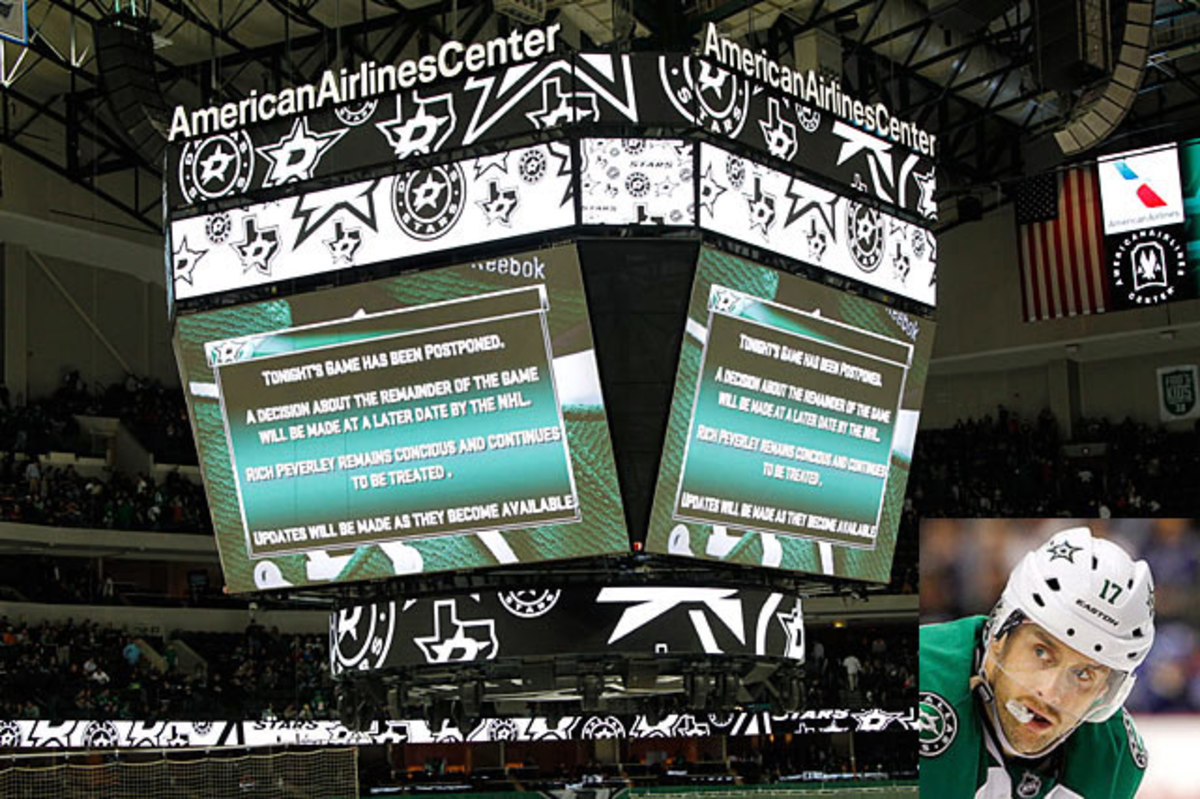
The Stars forward, who had been diagnosed with an irregular heartbeat, went into cardiac arrest and collapsed on his team's bench during a game on March 10 in Dallas. Quick action by team medical staff saved his life. Peverley, 31, was carried into a hallway where he received oxygen, an IV, chest compressions and a shock from a defibrillator that revived him. Unlike New York Rangers prospect Alexei Cherepanov, 19, who collapsed and died of heart failure during a KHL game on Oct. 18, 2008, Peverley beat an event that only two to 10 percent of victims survive. Here are some other notable incidents of NHL players suffering life threatening injuries and health issues during games.
Zach Redmond cut
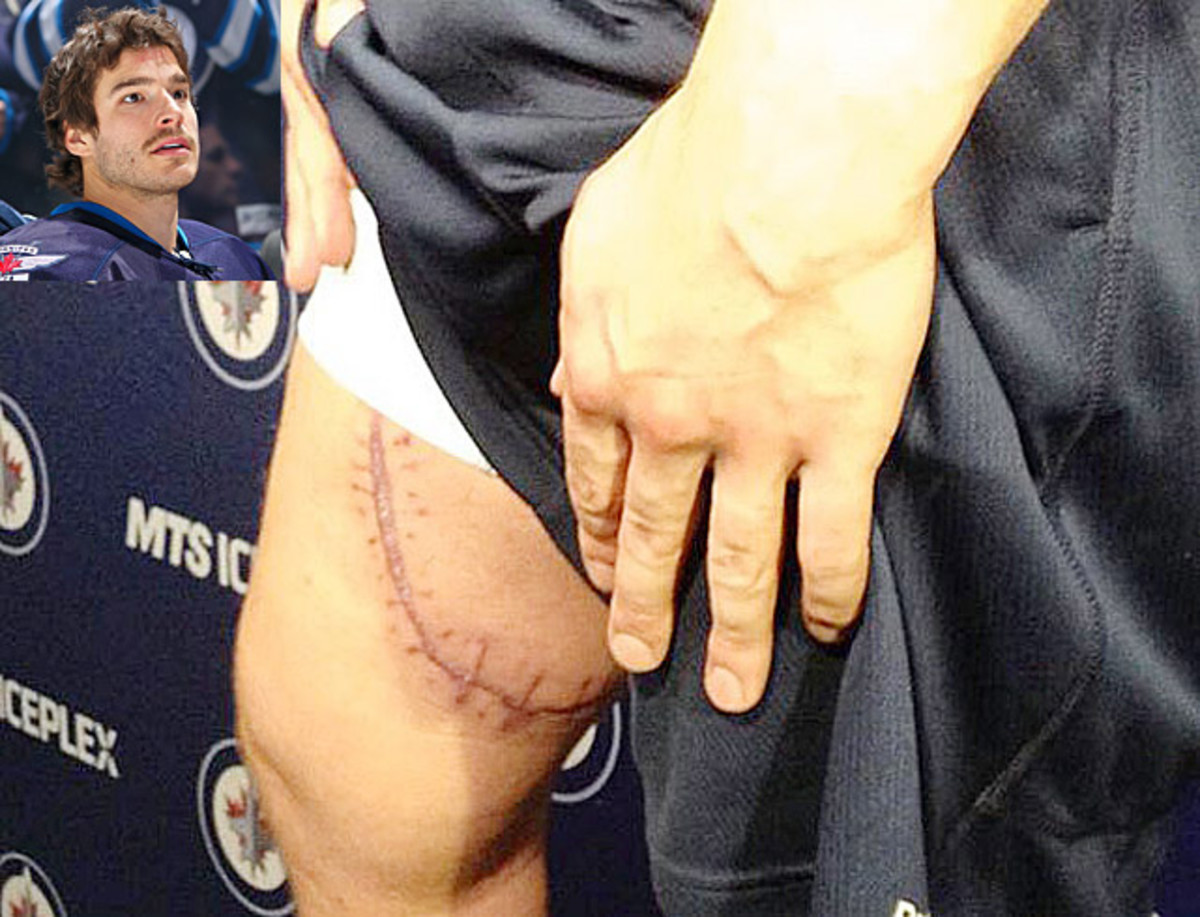
One of 2013's worst injuries occurred when the Winnipeg Jets' rookie defenseman had his right femoral artery slashed by a skate blade after he fell during a team practice in Raleigh, NC, on February 21. He nearly bled to death on the ice before team trainers were able to stabilize and get him into an ambulance. "I've been doing this for 12 years and that's easily the most-grave incident I've been a part of, for sure," Jets head athletic therapist Rob Milette told the <italics>Winnipeg Free Press</italics>. "He lost a lot of blood there and his heart was definitely struggling. We were monitoring his vitals, checking his pulse. His pulse was really weak and really slow. He was pale. He was starting to tell us he was getting thirsty and that told us he had lost a lot of blood." Remarkably, Redmond was back on skates and practicing with the team in early April.
Richard Zednik slashed
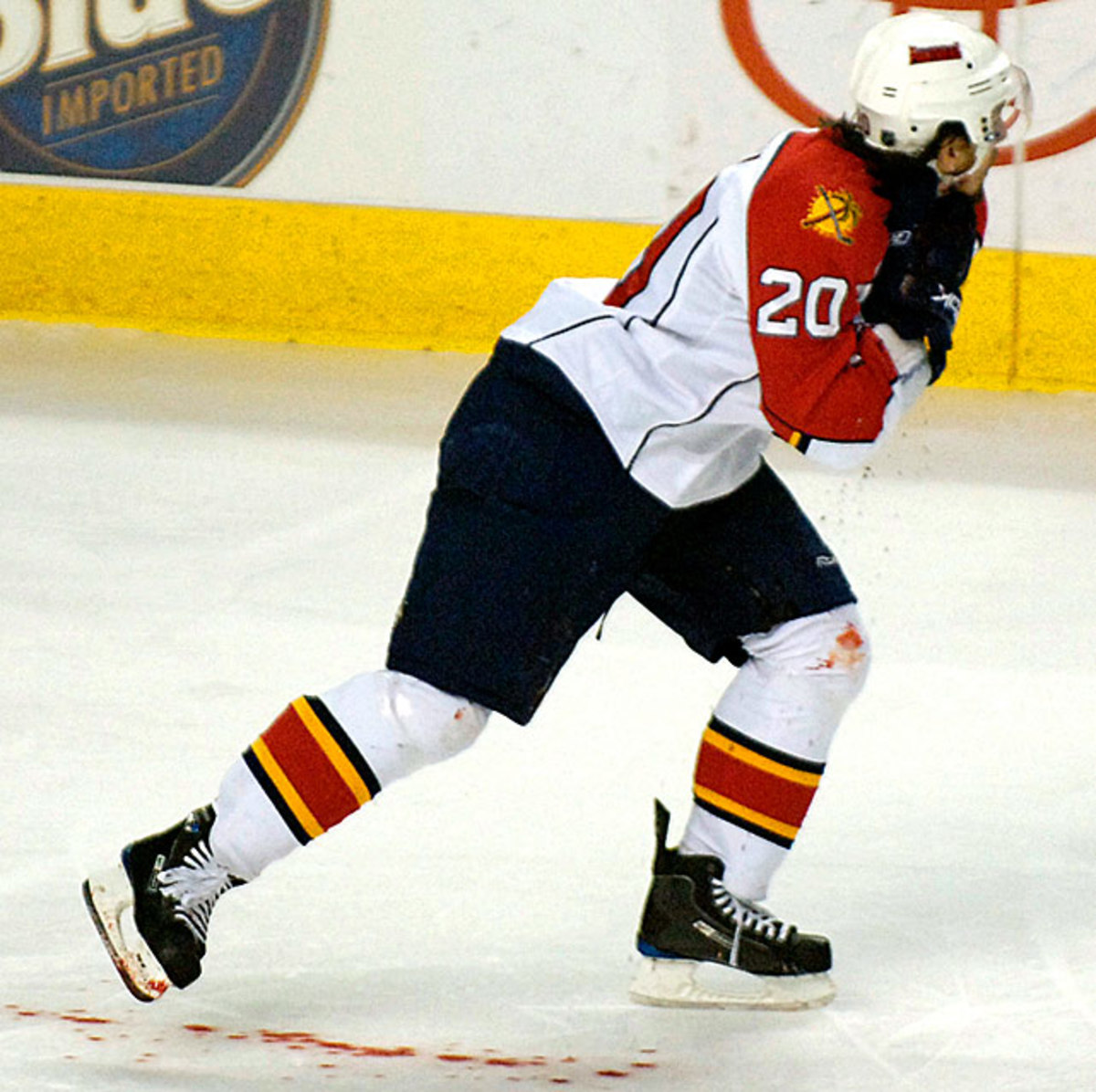
The Florida Panthers forward lost five pints of blood after his carotid artery was nearly severed by a teammate's skate, which barely missed his jugular, during a February 20, 2008 game in Buffalo. Zednik managed to skate back to his team's bench where an assistant trainer applied a towel to the wound, but he went into shock and had trouble breathing. Placed on a ventilator, he needed an hour-long surgery to reconnect the artery. New Jersey Devils coach Peter DeBoer, who coached Zednik in Florida, recently told <italics>The Star-Ledger</italics>'s Rich Chere. "He basically practically died in the hallway there in Buffalo." Zednik, who had been knocked out and hospitalized by a concussion, broken nose and bruised throat in 2002, returned to action seven months later.
Jiri Fischer's cardiac arrest
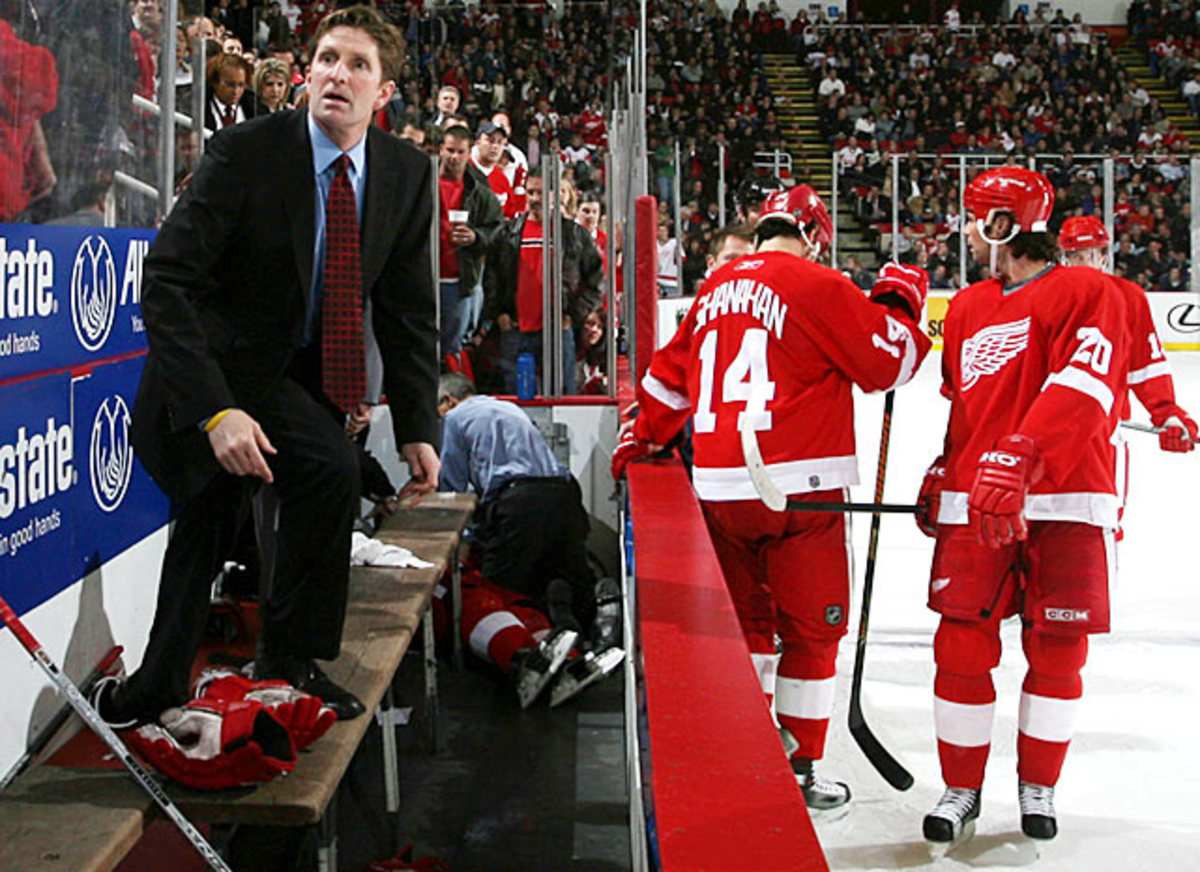
The 25-year-old Detroit Red Wings defenseman collapsed on his team's bench during a Nov. 21, 2005 game and was thought to be having a seizure. However, his heart had begun to beat too rapidly before it failed. Team doctor Tony Colucci immediately started CPR and Fischer was revived with a defibrillator while still in the bench area. He was later found to have a structural heart abnormality -- hypertrophic cardiomyopathy -- that included an unusually thick heart muscle. Fischer never played again. The incident led the NHL to mandate that two physicians be seated within 50 feet of the team benches with a defibrillator easily accessible.
Trent McCleary hit in the throat
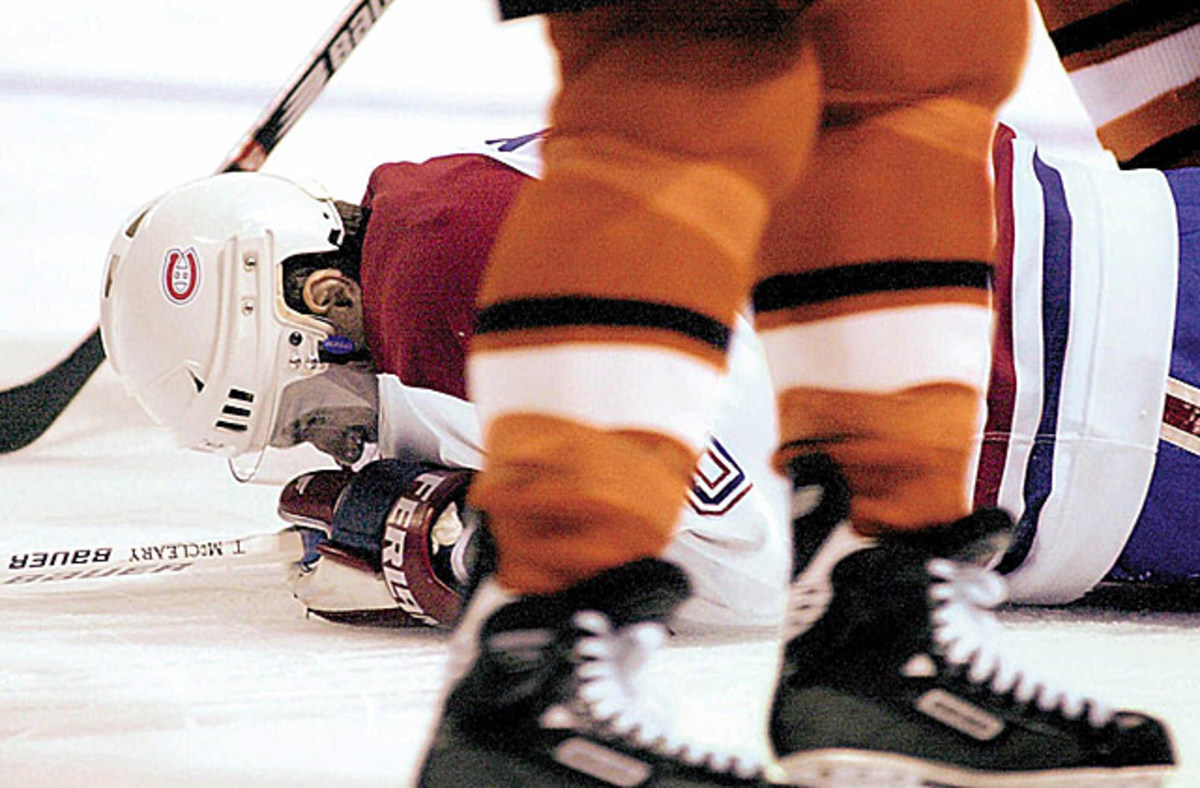
The Canadiens forward's larynx was fractured and his windpipe crushed when he was hit in the throat while blocking a hard one-timer off the stick of Philadelphia Flyers defenseman Chris Therrien in a January 29, 2000 game in Montreal. Therien later told Grantland's Sean McIndoe, "That's as hard as I can shoot the puck. And then I heard the gasping of the air. I'm saying somebody hurry, this guy's in really, really bad shape. And that gasp of air, that hoarse gasp of him not being able to breathe, I knew there was something very, very serious, and they had to do something very quickly." McCleary was able to get up and make it back to the bench, but he collapsed in the tunnel and needed an emergency tracheotomy at a local hospital. Several operations and months of therapy followed before he could speak again, and his playing career was ended by the injury.
Chris Pronger hit in the chest
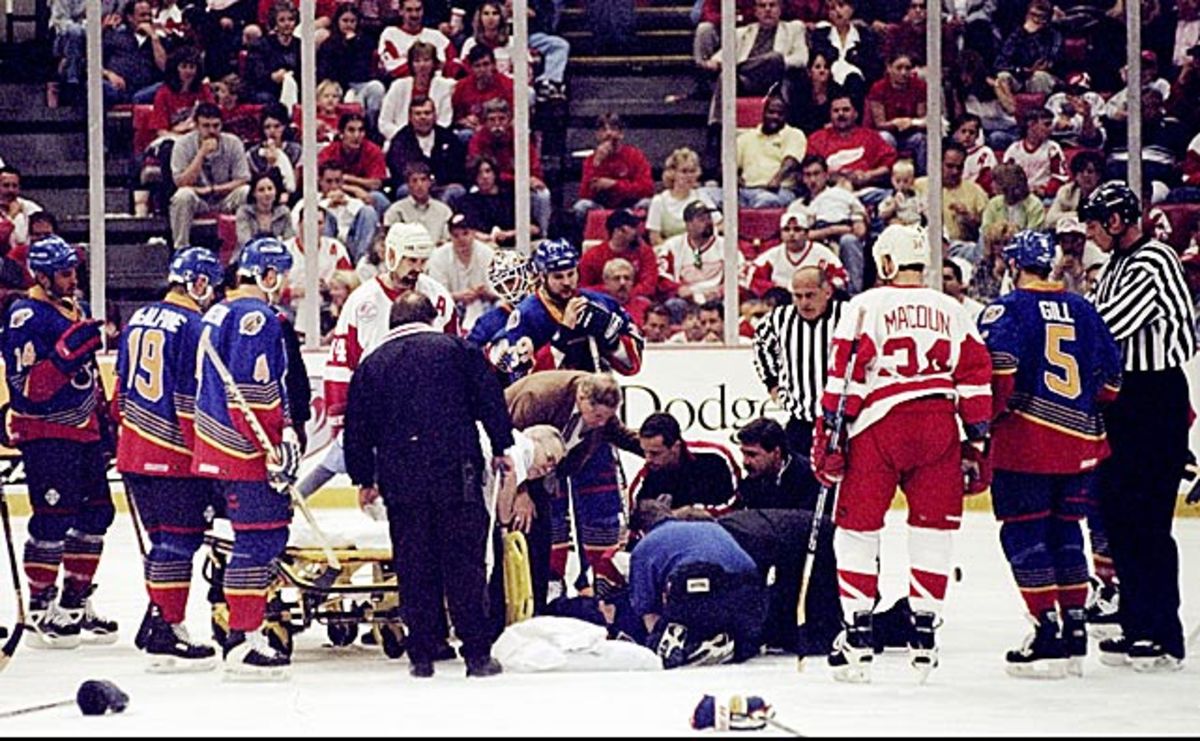
During a playoff game in May 1998, the St. Louis Blues defenseman was hit in the chest by a slapshot by Detroit's Dmitri Mironov. The impact disrupted his heart's rhythm and after taking two strides, Pronger's eyes rolled back into his head and he collapsed to the ice. Blues team trainer Ray Barile later reported that Pronger, whose heart had stopped briefly, was unconscious for 20 to 30 seconds as medical personnel attended to him. He was stretchered off to a hospital where tests revealed that his heartbeat had returned to normal. "At the end he was talking to me," Blues winger Geoff Courtnall told the <italics>Los Angeles Times</italics>. "He was asking me what happened and asking how much time was left in the game. [Rich Peverley asked the same question upon being revived in Dallas.] Emotionally, he was pretty scared. It would scare anybody."
Bryan Marchment has seizure
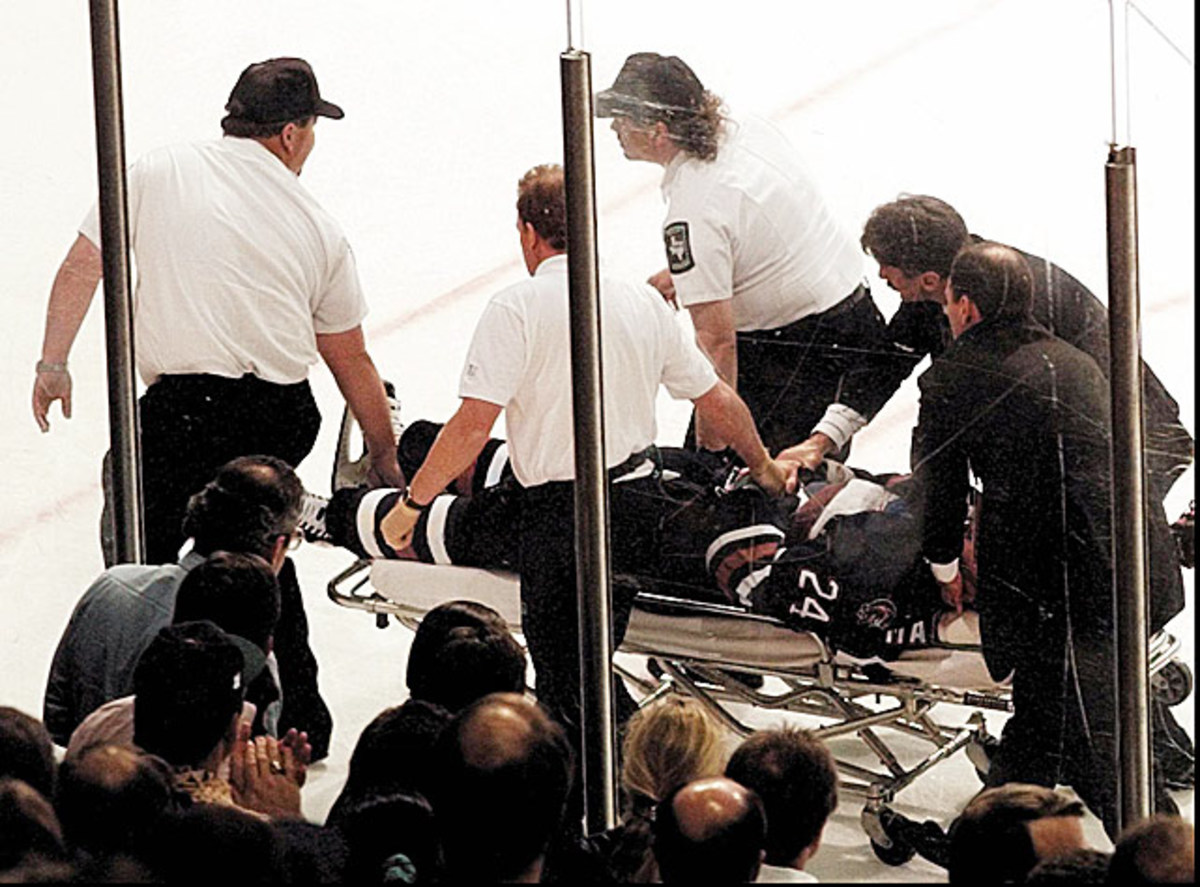
During Game 2 of his team's first-round playoff series vs. Dallas in April 1997, the Edmonton Oilers defensemen tripped and fell head-first into the penalty box door just as Stars forward Guy Carbonneau opened it to return to the ice. Marchment's helmet came off and he was severely concussed by the impact. The crowd and 1.5 million viewers on <italics>Hockey Night in Canada</italics> watched in horror as he convulsed on the ice. He regained consciousness while being rushed to a local hospital where an MRI and CAT scan found that he had sustained no brain damage. However, when he tried to play in the opening game of Edmonton's next series, he felt too dizzy to continue. He then took the summer off to fully recover.
Clint Malarchuk slashed
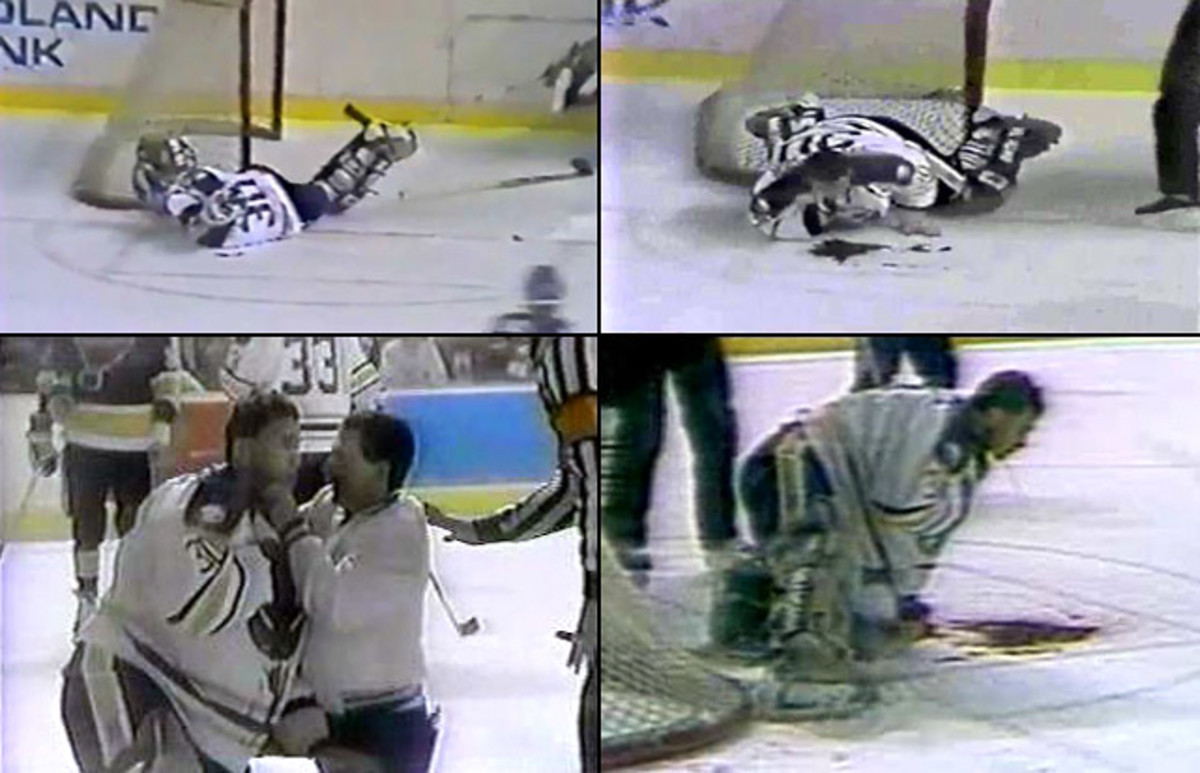
One of the NHL's most unforgettably horrible accidents occurred during a March 22, 1989 game in Buffalo when the Sabres' goaltender was slashed in the throat by the skate blade of a St. Louis Blues forward who had been knocked off balance and into the crease. Malarchuk, whose carotid artery was severed, nearly bled to death on the ice while fans in the stands fainted at the sight. His life was saved by team trainer Jim Pizzutelli, a former Army medic who had served in Vietnam. Pizzutelli pinched Malarchuk's wound closed and helped him to the dressing room. The stricken goalie needed 300 stitches to close the wound, but amazingly missed less than a week before he returned to a rousing ovation by Buffalo's fans. He even joked about what had happened, but was emotionally scarred by the incident and later suffered from post-traumatic stress syndrome.
Bill Masterton killed
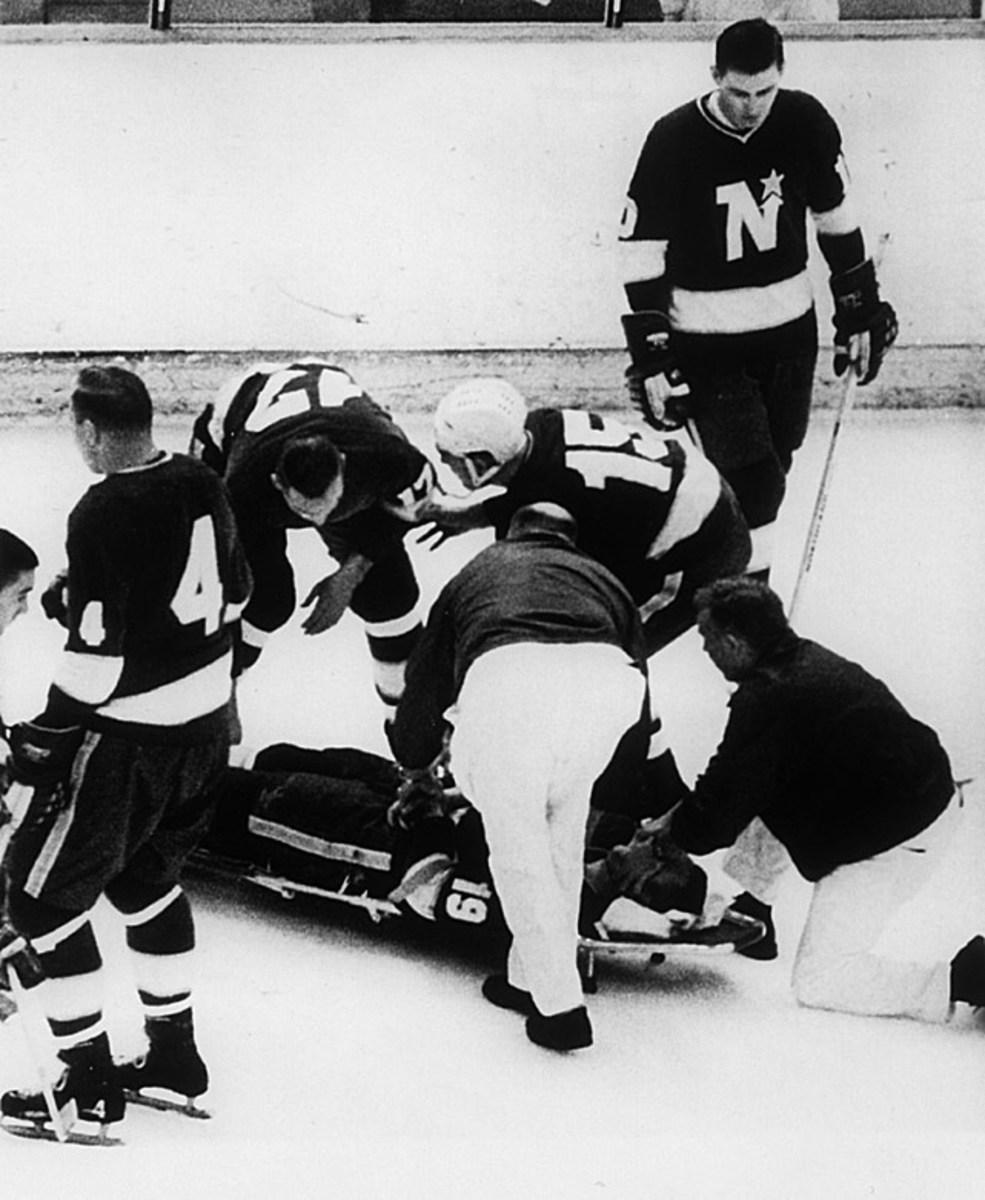
Head injuries, especially ones that leave players unconscious and medical staff fearing a broken neck or fractured skull, have plagued the NHL for decades and the league has been working to improve safety. The greatest concern is about a repeat of what happened to the Minnesota North Stars' journeyman center after he collided with two Oakland Seals and hit the back of his head on the ice during a Jan. 15, 1968 game. Masterton, 29, wasn't wearing a helmet and he appeared to be out cold before he landed. He died in a local hospital two days later. It is now believed that at the time of his fall he already had a concussion-related brain injury that was rendered fatal by the impact. The NHL's annual award for perseverance and dedication to hockey is named in his honor.
